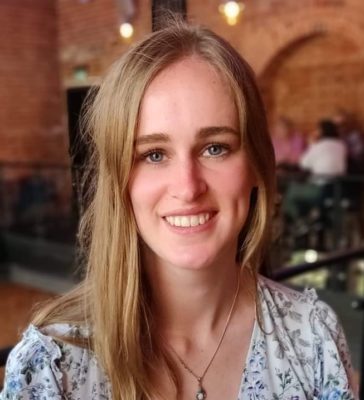
Rachel Duffin
Current Employer/Organisation Name
Guy’s and St Thomas’ NHS Foundation Trust
What have you been doing since leaving Exeter, and what are you doing now?
I took some time out and then started work in my current job, in the genetics department at Guy’s hospital in London. I am on a 3 year training programme working towards HCPC registration as a Clinical Scientist, and am simultaneously working towards a masters degree in Clinical Bioinformatics.
Why did you choose this career? And what do you enjoy most about your work?
I took two modules in bioinformatics during my undergraduate degree and a genetics final year project and really enjoyed that part of my degree. I also enjoyed the animal biology modules I took so I had to choose between a conservation biology career vs a bioinformatics/genetics career. I ultimately and decided on bioinformatics as there are lots of jobs in it at the moment and I believe that it is a future proof career.
Please tell us if you were a member of any societies, groups or sports clubs?
I was a member of Windriders throughout my 3 years, and I was also on the BioSoc committee as trip secretary in my second year. I was also a member of RAG and got involved with a number of charity events through that.
What did you enjoy most about your programme and what was the biggest highlight?
My favourite module was definitely the coral reef field course which I did at the end of my second year in the Bahamas, for obvious reasons! I also enjoyed the part of my final year bioinformatics module which was run by Dr Ben Temperton, where we had to write a pipeline to analyse marine viral genomes. The first time I was introduced to programming in second year I had really struggled with it and almost not carried on with it however when it came round to my final year and taking this module it was so well taught and explained, and provided a really interesting topic/dataset on which to work on, therefore it was a big contributor to me going into the career that I have chosen. Additionally I found that my final year project on transposable elements in bacterial genomes and their contribution to antibiotic resistance was another part of my degree programme that I enjoyed the most – I loved being able to get stuck in to a longer term project, which hadn’t been possible up until this point due to the short term nature of the modules.
What did you enjoy most about studying here?
I would say the great friends I made throughout my time at uni, I found some really great like minded friends, and without them I wouldn’t have enjoyed my time anywhere near as much. I also enjoyed how close it is to the coast and countryside, and I thought the size of the uni and town was great as you were able to live close by to all your friends for the whole 3 years which is something that isn’t always possible at universities in larger cities.
Why did you choose to study at Exeter?
I wanted to go to a Russell group campus university that was near the sea and countryside, and which had good teaching for Biology.
What skills and experiences have been most useful for your career?
Scientific essay writing has been extremely useful as I am studying for a masters as part of my job so still have to do a lot of coursework. Also, the confidence that I gained over the 3 years has been very useful, particularly in presenting as I have to do this as part of my training, and also skills in prioritising tasks and managing workload.
What advice would you give to a current student who wishes to pursue your career?
Don’t assume you aren’t experienced enough if you are applying straight from university. I applied after uni without masters degree and no real working experience in the area, and only applied to see what the application process was like as I was planning to go on to study a masters degree before applying again the next year. But I managed to get in and many people get in each year without masters or PhDs. Also I would say try and apply for jobs early, before you finish your degree, as I left this a bit late and it gets harder and harder the longer you leave it.
What are your plans for the future?
Firstly I am planning on moving into London as I am currently commuting from my parents house in Winchester which is a lot! I will be working in the same job for the next 2 and a half years and if I pass my exit interview panel I will then be HCPC registered and able to apply for jobs as a fully qualified clinical Bioinformatician at any NHS trust. I could either stay in the NHS, work for a private company, or work in a job that requires programming knowledge but isn’t at all biology based. I am not sure exactly what my plans are for when I leave yet though.

